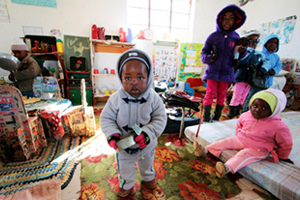Life in a thousand days
29 October 2013 | Story Helen Swingler.
In a dusty compound in the North West, four young children are crouched on a mat in the sun, matching basic shapes and colours on a chart under the watchful eye of a community caregiver.
It's play with purpose. And it's life-giving, according to research showcased in the just-launched South African Child Gauge 2013, published by UCT's Children's Institute, in partnership with the United Nations Children's Fund (UNICEF) and Ilifa Labantwana.
Children face a make-or-break period in the first 1 000 days of life, from the womb to their second birthday; a window of opportunity than can be life-giving, or destroy their chances irreparably.
This 1 000-day period will determine whether they have poor health and stunted growth, and whether they cope at school or drop out. It will shape the future of their families and communities, and at the far end of the scale, the stability and prosperity of the nation.
Adverse circumstances
According to the Child Gauge 2013, researchers have pinpointed this as the time of maximum plasticity for growth and development, even in the adverse circumstances of poverty that 58% of South Africa's 18.5 million children are born into.
In addition, General Household Survey data from 2011 show that 58% of children from birth to nine years live in households with an income of less than R604 per person per month.
Research by the Human Sciences Research Council has found that malnutrition stunts the growth of more than 25% of children under the age of three.
The odds are stacked against the country's poor children. But with commitment and the right policies, there's hope, says the Gauge 2013. Based on rigorous research, it has become a thermometer for how the country's children are faring according to a broad range of indicators.
As guest speaker, Associate Professor Viviene Taylor (head of the Department of Social Development) commented in her welcome address: "The Child Gauge helps us conceptualise frameworks for what really matters in children's development."
As such, it's become a vital handbook for government and civic organisations concerned with children's rights and welfare.
Essential services
This edition focuses on essential services and support for young children (primarily in the arena of early childhood development), and illustrates how these can break the intergenerational cycle of poverty and inequality.
Speaking at the launch, hosted at the Centre for the Book, Minister of Social Development Bathabile Dlamini said the government is scaling up delivery of services in this, and allied, areas. The government is investing some R1.2 billion in a comprehensive national strategy to provide a well- resourced, co-ordinated and managed early childhood development system, in addition to support for youth-headed households and other empowerment initiatives.
She said the South African National Development Plan Vision for 2030 recognises the need to invest in early childhood development, if the country is to meet its goals and dramatically improve human development.
In this sense, the early childhood development campaign is not an isolated endeavour but works with other development plans, specifically those outlined in the 2012-2016 Strategic Plan for Maternal, Newborn, Child and Women's Health and Nutrition, where the focus is on nutrition. Senior researcher at the Children's Institute and the lead editor of the Child Gauge 2013, Lizette Berry, said the unequal society in which South Africa's children are growing up is "threatening their development and that of the country in the long term".
Support must start even earlier, said co-editor Emeritus Professor Andy Dawes (Psychology Department). Conditions for a child's development begin even before birth; mothers need adequate support from pregnancy through the child's infancy, into their pre-school years and the foundation phase of schooling.
The Child Gauge 2013 outlines a multi-pronged approach targeting an essential package of services and support for young children and their caregivers: nutrition, health, early-learning programmes, social services, and support for primary caregivers, who are also subject to violence, illness and social isolation. All of these affect caregivers' ability to care for children in ways that help their development.
Rural plight
Access and quality are also limiting factors to early childhood development, particularly in rural settings and communities at the periphery of urban areas, where early childhood development provisions fall short of minimum standards, Dlamini noted. Ideally, early childhood development practitioners should be trained at FET (Further Education and Training Colleges) level.
It is important to cast the net wide, drawing on a range of strategies to enhance access to services; from home visits (where practitioners visit rural families two to three times a week), playgroups and mobile units, to formal early childhood development centres, clinics and schools.
While government has specific responsibilities to support young children and families, everyone has a role to play, says Sherri le Mottee, Ilifa Labantwana programme leader.
"Early childhood development is a community initiative. It's not just the role of parents or caregivers, but of the whole community. Every person who comes into contact with young children has an opportunity to shape and support their development."
"We want children to start strong and finish strong," Berry concluded.
 This work is licensed under a Creative Commons Attribution-NoDerivatives 4.0 International License.
This work is licensed under a Creative Commons Attribution-NoDerivatives 4.0 International License.
Please view the republishing articles page for more information.










